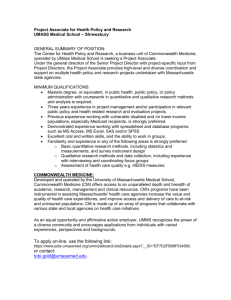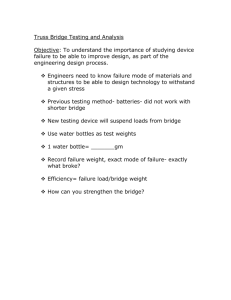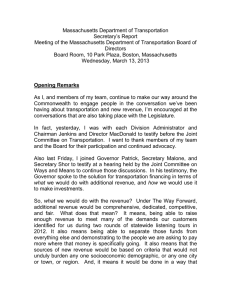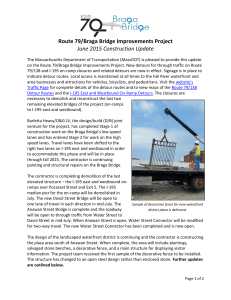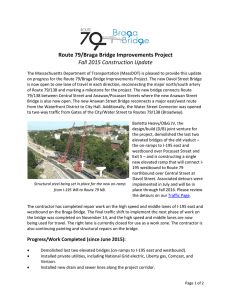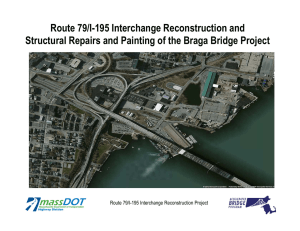Massachusetts Department of Transportation Secretary’s Report
advertisement
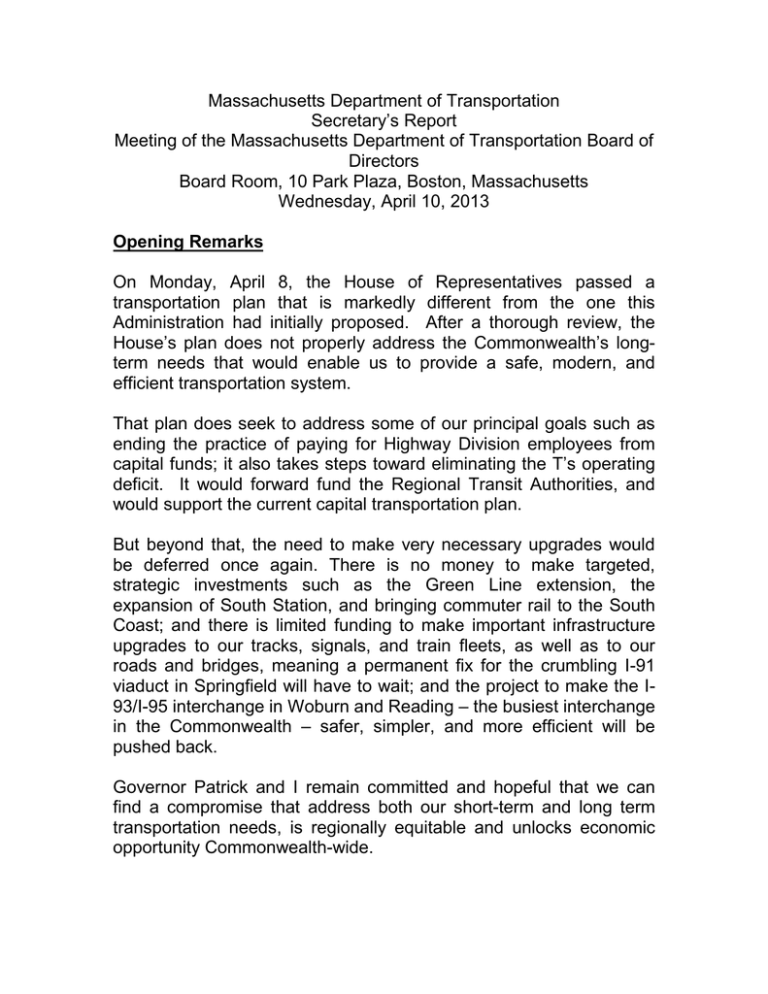
Massachusetts Department of Transportation Secretary’s Report Meeting of the Massachusetts Department of Transportation Board of Directors Board Room, 10 Park Plaza, Boston, Massachusetts Wednesday, April 10, 2013 Opening Remarks On Monday, April 8, the House of Representatives passed a transportation plan that is markedly different from the one this Administration had initially proposed. After a thorough review, the House’s plan does not properly address the Commonwealth’s longterm needs that would enable us to provide a safe, modern, and efficient transportation system. That plan does seek to address some of our principal goals such as ending the practice of paying for Highway Division employees from capital funds; it also takes steps toward eliminating the T’s operating deficit. It would forward fund the Regional Transit Authorities, and would support the current capital transportation plan. But beyond that, the need to make very necessary upgrades would be deferred once again. There is no money to make targeted, strategic investments such as the Green Line extension, the expansion of South Station, and bringing commuter rail to the South Coast; and there is limited funding to make important infrastructure upgrades to our tracks, signals, and train fleets, as well as to our roads and bridges, meaning a permanent fix for the crumbling I-91 viaduct in Springfield will have to wait; and the project to make the I93/I-95 interchange in Woburn and Reading – the busiest interchange in the Commonwealth – safer, simpler, and more efficient will be pushed back. Governor Patrick and I remain committed and hopeful that we can find a compromise that address both our short-term and long term transportation needs, is regionally equitable and unlocks economic opportunity Commonwealth-wide. Transportation Bond Bill Acknowledging the needs of our transportation system, Governor Patrick filed a transportation bond bill on March 13. The bill, which would fund the “The Way Forward,” the 10-year plan for the next generation of investments to maintain and modernize our system, provides the substance to the blueprint we laid out in our initial plan. The bill would invest $13.7 billion over the next decade to address the backlog of deferred projects and would also allow us to make those smart investments to bring our system up to a standard that our customers expect. In addition, this bill continues funding current investments identified in the statewide road and bridge program for the Fiscal Year 2013-2017 Capital Investment Plan. In total, the bill authorizes $19 billion of capital investment in the Commonwealth’s transportation system. Taken together, this legislation represents the Administration’s commitment to a 21st-century transportation system for Massachusetts. Rapid Bridge Replacement: I-195 - Fairhaven We’ve spent a considerable amount of time talking about what we would do, and today we have some exciting news about what we are doing. Our rapid bridge replacement project for I-195 over River Avenue in Fairhaven began on March 22. Much like the “93Fast14” project in Medford, reconstruction of the I-195 bridges is using eight prefabricated bridge units to replace the existing, deteriorated bridge decks. Using traditional construction methods and overnight roadway closures to replace the superstructures, the project would take between 12 to 18 months to complete and would have disrupted the routines of approximately 50,000 drivers each day. Using a lane shift similar to “Fast14,” we have been able to keep both directions of travel open at all times during the $5 million effort. And while we promised to complete the work in four weekends, I’m happy to announce we are now trending to finish in just three. Public-Private Partnership Commission On March 25, the Governor announced his appointments to the Public-Private Infrastructure Oversight Commission, and I want to publicly acknowledge and congratulate Director Alan Macdonald on his appointment. The commission’s first charge is to bring innovative thinking to the ways in which we can develop public-private partnerships that will allow the T and DOT to be smarter about how we deliver customer services, better at sharing costs and generating new revenues, and more efficient in how we develop infrastructure projects. I look forward to the Commission’s work getting started and again, I congratulate Director Macdonald on his appointment. Thank you, Mr. Chairman. That concludes my remarks.

